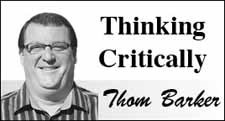I love science. With every little secret we unlock, myriad new mysteries are revealed. That is why our knowledge is always accelerating and expanding, much like the universe itself.
Over the next two weeks, I will count down the 12 science stories I found most intriguing, exciting, inspiring and/or frustrating during 2012.
12: Warp drive
The concept of a method of propulsion that allows us to fold space upon itself and travel faster than the speed of light is science fiction at its very best. And, unfortunately, it is probably the only solution that could ever make interstellar exploration practical.
Even our closest neighbour star is more than four light years away. With current technology it would take tens of thousands of years to get there.
This year, however, NASA scientists gave us a photon of hope by proving, at least theoretically, that 'warp' travel may be plausible.
In theory, a warp field generated by a ring of exotic matter that expands space-time behind a moving object would contract space in front of the object.
The math works, but going from theory to practice is another matter. Dr. Harold White and a team of physicists at NASA Eagleworks are attempting to do just that. White and his colleagues set up a mini warp-drive called White-Juday Warp Field Interferometer, which they are hoping will generate a tiny instance of space-time perturbation.
If successful, it will be what scientists call "existence proof" or a "Chicago pile" moment after the 1942 table-top nuclear reaction experiment that proved the then-theoretical concept of nuclear fission.
Is it still an outlandish prospect? Absolutely, but isn't everything scientific until it is proven?
11. Private space flight
When NASA announced it was shutting down its space shuttle program cosmophiles were understandably nervous and disappointed. But the venerable space agency was not anywhere near getting out of space exploration; they had merely determined it was time to turn the business of supplying the International Space Station (ISS) over to private enterprise.
In May, that became a reality when SpaceX became the first commercial company to dock a space ship with the ISS.
This story is so noteworthy because it means near-Earth orbit space travel has become routine enough that it doesn't require the long-ranging vision and deep pockets of government. NASA can turn its resources and attention to what it does best, push the limits of human achievement beyond the Earth.
10. Curiosity
It cannot be overstated what an amazing accomplishment it is to put a mobile science laboratory on another planet. Just the mathematics involved in targeting another celestial object at least 50 million kilometres from Earth, which is rotating at 868 kph and orbiting the sun at 86,000 kph while the solar system itself is orbiting at 67,000 kph the centre of the galaxy, which is itself travelling at 2.5 million kph through the universe is simply amazing.
To then execute that math with a 4,000 kg space ship that delivered the 1,000 kg Curiosity Mars Rover within 2.4 kilometres of its target is a mind-boggling feat of precision engineering. That the rover, equipped with a an array of sensitive scientific instruments, could then be operated from Earth for what scientists are now estimating will be the next three years in the hostile environment of Mars, well, you get point.
The only reason this story appears so far down my list is that we've done it before.
9. Geologists convicted
This story infuriated me more than just about anything I read this year. In October, an Italian court convicted seven geology and disaster experts of manslaughter for not adequately warning officials about a deadly 2009 quake that killed 300 in central Italy. They were sentenced to six years in prison.
At the heart of the prosecution's case were a series of small tremors preceding the April 2009 quake that measured 6.4 on the Richter scale. The prosecution argued these should have formed the basis for a warning, which flies in the face of science.
In the first place, as much as we have come to know about earthquakes, there is still no way to predict where and when they will happen.
Secondly, it's unusual that small tremors are a precursor to large events.
Finally, it is not the role of scientists to warn the public about potential natural disasters. These prominent researchers did provide the appropriate information to the appropriate authorities.
If this was not a witch hunt reminiscent of the Inquisition, I can't fathom what would be. We can only hope more reasonable heads will prevail when the case is appealed.
8. One last step
In 2012, humanity lost one of its great heroes. Neil Armstrong was the first person to set foot on another world. The intestinal fortitude it must take to do something that no one else has ever done is, alone, a remarkable inspiration.
Armstrong became a symbol of the best of what we are. His words, "One small step for man, one giant leap for mankind," instantly became one of the most quotable quotes in history.
Armstrong died August 25, 2012 at the age of 82.
7. Happy two millionth
The human family tree became even more complete in 2012 with a remarkable archeological find in Â鶹ÊÓƵ Africa. Researchers uncovered an almost complete skeleton of Australopithecus sediba dated at two million years old.
A. sediba was an upright-walking tree climber who excited scientists with its many human-like characteristics.
"The many very advanced features found in the brain and body, and the earlier date make it possibly the best candidate ancestor for our genus, the genus Homo, more so than previous discoveries such as Homo habilis," said Professor Lee Berger, a reader in evolution at the Institute for Human Evolution at the University of Witwatersrand in Johannesburg, Â鶹ÊÓƵ Africa.
With every find such as this, the rich history of humanity is enhanced.
Please see my "Thinking Critically" column next week for my Top 6 science stories of 2012.




